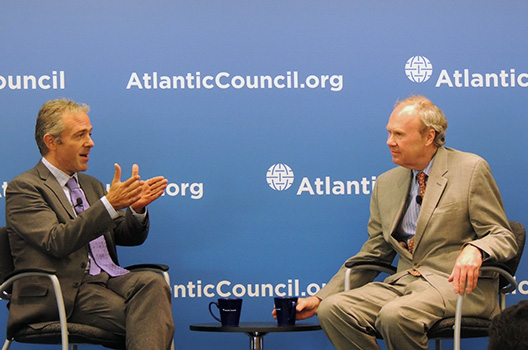 “This is the closest you’re going to come to seeing through the fog and making sense of the megatrends that are coming” said Frederick Kempe, Atlantic Council President and CEO, of Mathew Burrows’ latest publication, The Future Declassified: Megatrends that Will Undo the World Unless We Take Action. The book expands on his work on global trends at the US National Intelligence Council. On September 16, Mathew Burrows, now the director of the Brent Scowcroft Center on International Security’s Strategic Foresight Initiative, in conversation with Edward Luce, Financial Times’ Washington columnist and commentator, discussed the impacts of these megatrends. Over the course of the evening, discussion ranged on everything from the future of the Middle East to Western democracies’ ability to not only cope with the future but innovate to better meet its challenges.
“This is the closest you’re going to come to seeing through the fog and making sense of the megatrends that are coming” said Frederick Kempe, Atlantic Council President and CEO, of Mathew Burrows’ latest publication, The Future Declassified: Megatrends that Will Undo the World Unless We Take Action. The book expands on his work on global trends at the US National Intelligence Council. On September 16, Mathew Burrows, now the director of the Brent Scowcroft Center on International Security’s Strategic Foresight Initiative, in conversation with Edward Luce, Financial Times’ Washington columnist and commentator, discussed the impacts of these megatrends. Over the course of the evening, discussion ranged on everything from the future of the Middle East to Western democracies’ ability to not only cope with the future but innovate to better meet its challenges.
When asked about the future of the Middle East, Burrows was not too hopeful, forecasting that “The Middle East is going to be unstable for a generation or more.” Overall, Burrows was more worried, in the long term, “about the rivalry between Iran and Saudi Arabia,” which he sees as the defining conflict in the Middle East, compared to the recent rise of ISIS which he described as something that was “preventable.” Burrows cited demographic shifts and a bulging youth population coupled with a weak economy as a root cause for Middle East conflict that was likely to create a self-perpetuating cycle of crises.
One broad trend Burrows was asked to speak on was the phenomenon of the rising “power of one,” the title of the opening chapter to Burrows’ book. The internet and other technologies are actively disseminating agency away from the nation-state and other institutions towards individuals. Yet, Burrows cautioned, this trend isn’t necessarily inevitable. Paradoxically, technology is also increasing the amount of information that governments and other powers have access to and can manipulate. He cited the surprising adoption of social media by authoritarian governments as an example, “where they are not only using it to suppress but are actively learning about their own societies to better survive.”
A pressing theme in the evening’s questions was on the general perception of a decline in the West due to an ostensible inability by Western governments to effectively address an increasing number of challenges: from rising social inequality internally to economic “convergence” with the emerging world (e.g. “the rise of the rest”). Democracies themselves were what Burrows was most worried about. “They have not adapted well… [and now] you are seeing issues of trust, the upcoming UK vote is an example. Unfortunately, I just don’t see how we’re going to get those institutions reformed.” In reference to the United States, he cited rampant inequality, gerrymandering, and campaign finance law as areas limiting the strength of American democracy for future challenges. Despite these issues, Burrows remained optimistic that if future generations become more politically active and bring together “the right constellation of organizations and factors,” we could face our looming global challenges.
